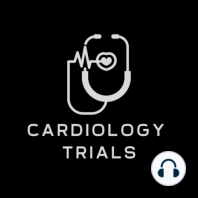11 min listen
Review of the DIGAMI trial
ratings:
Length:
9 minutes
Released:
Feb 20, 2024
Format:
Podcast episode
Description
J Am Coll Cardiol 1995;26:57-65.Background Patients with diabetes have higher short- and long-term rates of mortality following acute myocardial infarction (AMI). Possible explanations for this include increased fatty acid metabolism, compromising glycolysis in ischemic and nonischemic areas as well as impairment of platelet and fibrinolytic function. This led to the theory that both processes could be improved with insulin infusion. Small studies at the time provided conflicting results. The Diabetes Mellitus Insulin-Glucose Infusion in Acute Myocardial Infarction (DIGAMI) trial sought to test the hypothesis that rapid improvement of metabolic control in diabetic patients with AMI by means of insulin-glucose infusion would decrease early mortality and that continued good metabolic control would improve subsequent prognosis.Cardiology Trial’s Substack is a reader-supported publication. To receive new posts and support our work, consider becoming a free or paid subscriber.Patients Patients admitted to the CCUs of 19 Swedish hospitals with suspected AMI within the preceding 24 hours with a blood glucose level >11 mmol/l (198 mg/dl) with or without a previous history of diabetes mellitus. Exclusion criteria included inability to participate for reasons of health, refusal to give consent, residence outside the catchment area or enrollment in other studies.Baseline characteristics There were 1,240 patients who met inclusion criteria and 50% were excluded, mainly due to inability or unwillingness to participate. Compared to those enrolled, excluded patients were older (72 years of age) and more were women. The majority of those enrolled were men (62%) at an average age of 68 years. Nearly 40% had a history of previous MI and 22% had congestive heart failure. The mean time from the onset of symptoms to randomization was 13 hours. More than 80% of patients were non-insulin dependent. The average HbA1c at randomization was 8% and the blood glucose was 279 mg/dl.Procedures Patients randomized to insulin therapy were started on an insulin-glucose infusion at 30 ml/h and blood glucose was checked after 1 hour. The infusion rate was adjusted according to protocol. The infusion was continued until stable normoglycemia was attained for ≥24 hours. Subcutaneous administration of insulin was given immediately after cessation of the infusion, according to a multidose regimen, with the aim of maintaining normoglycemia. Serum potassium was measured immediately before the infusion and then after 6, 12, and 24 hr and was checked immediately in patients who developed any kind of clinically significant arrhythmia. Control patients were treated according to standard coronary care unit practice and did not receive insulin unless it was deemed clinically indicated.Endpoints The primary endpoint was all-cause mortality at 3 months. The investigators hypothesized that the insulin-glucose infusion followed by multidose subcutaneous insulin for 3 months would reduce the mortality rate by 30%, from a 35% mortality rate in the control group (35/100 to 24.5/100). Based on that assumption, a sample size of 600 was needed to demonstrate the expected mortality reduction with a 5% significance level and power of 80%.Results 620 patients were randomized, 306 to the intervention group and 314 to the control group. The blood glucose level was significantly lower in the insulin group 24 hours after randomization (173 mg/dl vs 211 mg/dl; p<0.0001) and at hospital discharge (148 mg/dl vs 162 mg/dl; p<0.01) but not at 3 months (153 mg/dl vs 162 mg/dl; p=NS) or 1 year (averages not provided). HbA1c was significantly lower at 3 months (7.0% vs 7.5%; p<0.01). Hypoglycemia during insulin infusion occurred in 15% of patients in the intervention group and none in the control group and hospital length of stay was significantly longer in the intervention group (11.3 vs 9.5 day; p=0.04).At 3 months, insulin treatment did not significantly reduce the primary endpoint of mortality c
Released:
Feb 20, 2024
Format:
Podcast episode
Titles in the series (41)
Review of the ISIS-2 Trial by Cardiology Trials
